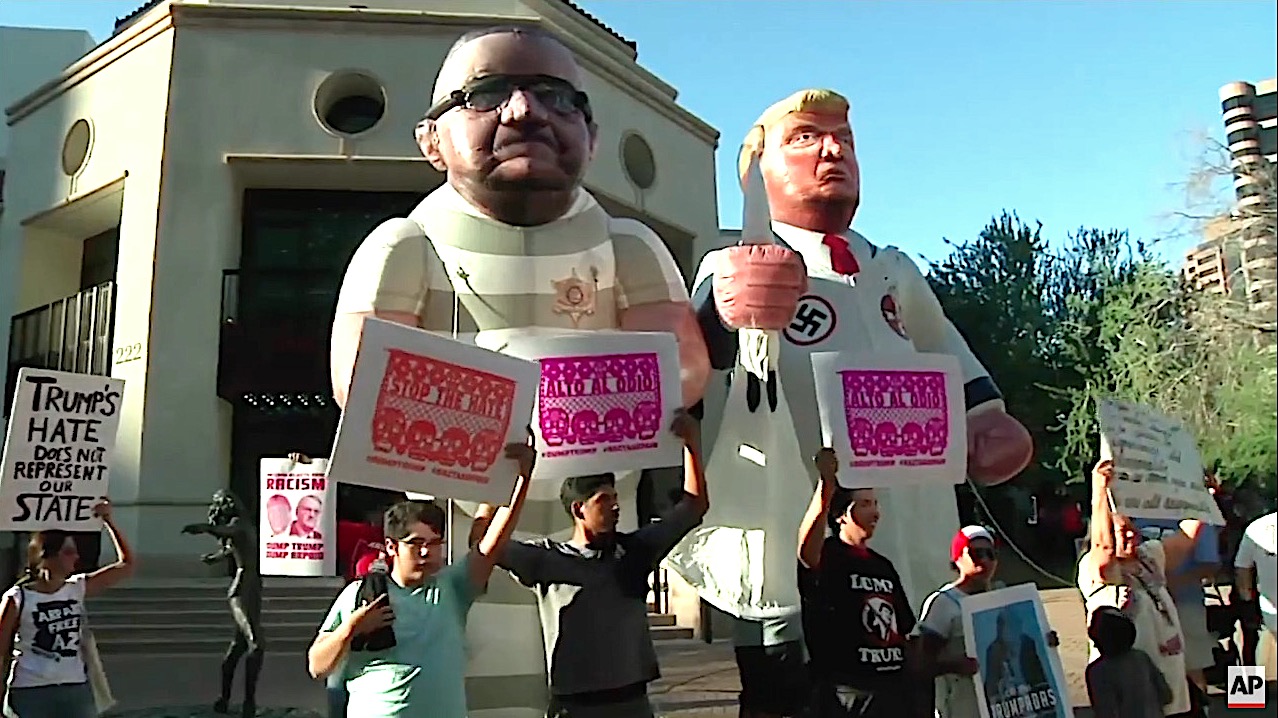If Trump plans to pardon Joe Arpaio today, he apparently hasn't told the Justice Department about it yet


A free daily email with the biggest news stories of the day – and the best features from TheWeek.com
You are now subscribed
Your newsletter sign-up was successful
President Trump is holding a campaign-style rally in Phoenix, Arizona, on Tuesday night, and he mentioned on Fox News last week that he's "seriously considering" a pardon for Joe Arpaio, the former Maricopa County sheriff recently convicted of criminal contempt for disregarding a federal judge's racial-profiling order before Arizona voters declined to re-elect him last year. If Trump plans to announce the pardon at the Phoenix rally, as widely believed plausible, he won't have gone through the normal channel for presidential pardons, CNN reports, citing a source familiar with that process.
Usually, a petitioner for a presidential pardon, serving time for a federal offense, submits a request to the Justice Department's Office of the Pardon Attorney, who reviews the application and gives a recommendation to the deputy attorney general, who makes his or her own recommendation to the president. Trump does not have to follow this process, and there is some precedent for a president pardoning a controversial ally without going through the Justice Department, as former President George W. Bush did when he commuted Scooter Libby's sentence in 2007.
Arpaio told The New York Times last weekend that he has not spoken with Trump since November, was "honored by the potential pardon," and would accept it if offered. Phoenix Mayor Greg Stanton asked Trump last week to postpone the rally, especially if he plans to pardon Arpaio, saying such an announcement at a raucous rally would just "enflame emotions and further divide our nation" after Charlottesville. On Monday, Stanton and other Phoenix officials said they will do their best to balance the risks of clashes against public safety and everyone's First Amendment rights. You can watch their comments and footage of early protests below. Peter Weber
The Week
Escape your echo chamber. Get the facts behind the news, plus analysis from multiple perspectives.

Sign up for The Week's Free Newsletters
From our morning news briefing to a weekly Good News Newsletter, get the best of The Week delivered directly to your inbox.
From our morning news briefing to a weekly Good News Newsletter, get the best of The Week delivered directly to your inbox.
A free daily email with the biggest news stories of the day – and the best features from TheWeek.com
Peter has worked as a news and culture writer and editor at The Week since the site's launch in 2008. He covers politics, world affairs, religion and cultural currents. His journalism career began as a copy editor at a financial newswire and has included editorial positions at The New York Times Magazine, Facts on File, and Oregon State University.
-
 Buddhist monks’ US walk for peace
Buddhist monks’ US walk for peaceUnder the Radar Crowds have turned out on the roads from California to Washington and ‘millions are finding hope in their journey’
-
 American universities are losing ground to their foreign counterparts
American universities are losing ground to their foreign counterpartsThe Explainer While Harvard is still near the top, other colleges have slipped
-
 How to navigate dating apps to find ‘the one’
How to navigate dating apps to find ‘the one’The Week Recommends Put an end to endless swiping and make real romantic connections
-
 ‘One Battle After Another’ wins Critics Choice honors
‘One Battle After Another’ wins Critics Choice honorsSpeed Read Paul Thomas Anderson’s latest film, which stars Leonardo DiCaprio, won best picture at the 31st Critics Choice Awards
-
 A peek inside Europe’s luxury new sleeper bus
A peek inside Europe’s luxury new sleeper busThe Week Recommends Overnight service with stops across Switzerland and the Netherlands promises a comfortable no-fly adventure
-
 Son arrested over killing of Rob and Michele Reiner
Son arrested over killing of Rob and Michele ReinerSpeed Read Nick, the 32-year-old son of Hollywood director Rob Reiner, has been booked for the murder of his parents
-
 Rob Reiner, wife dead in ‘apparent homicide’
Rob Reiner, wife dead in ‘apparent homicide’speed read The Reiners, found in their Los Angeles home, ‘had injuries consistent with being stabbed’
-
 Hungary’s Krasznahorkai wins Nobel for literature
Hungary’s Krasznahorkai wins Nobel for literatureSpeed Read László Krasznahorkai is the author of acclaimed novels like ‘The Melancholy of Resistance’ and ‘Satantango’
-
 Primatologist Jane Goodall dies at 91
Primatologist Jane Goodall dies at 91Speed Read She rose to fame following her groundbreaking field research with chimpanzees
-
 Florida erases rainbow crosswalk at Pulse nightclub
Florida erases rainbow crosswalk at Pulse nightclubSpeed Read The colorful crosswalk was outside the former LGBTQ nightclub where 49 people were killed in a 2016 shooting
-
 Trump says Smithsonian too focused on slavery's ills
Trump says Smithsonian too focused on slavery's illsSpeed Read The president would prefer the museum to highlight 'success,' 'brightness' and 'the future'
